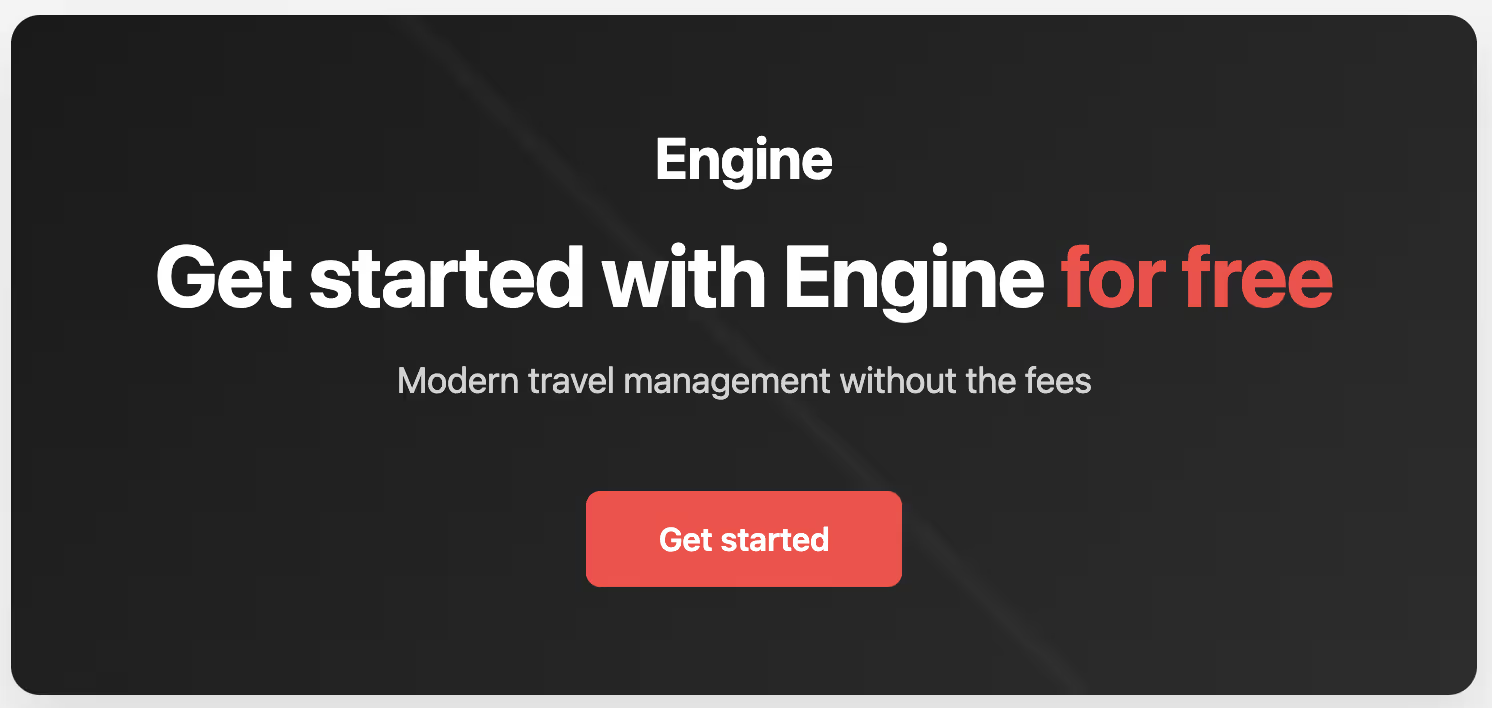Your TMC Is Charging You Twice: Calculate the Real Cost (2025)

Most travel management companies (TMCs) drain your travel budgets faster than finance teams realize.
Your crew needs hotels near the job site. Your current booking system charges three separate fees just to book a flight, hotel, and rental car for one worker.
This guide breaks down what TMCs cost and gives you a framework to budget smartly. Plus, we'll show you how Engine cuts these fees. No transaction charges, no management fees, no contracts.
The Hidden Fees Your TMC Adds to Your Projects
While TMCs promise savings, you're paying fees for access to rates that may not beat direct booking platforms and add nothing to crew accommodations or job outcomes.
You're paying twice. Once in TMC charges, again in paperwork chaos that pulls your operations team away from managing projects.
Most TMC fee structures drain project budgets through multiple layers of charges:
Transaction-Based Fees
If your TMC charges per booking component, the cost adds up quickly.
Flight booking fee + hotel fee + rental car fee = three separate charges for one crew member's trip. Phone bookings cost $25-35+, online platforms $10-20, simple reservations $5-15.
Need to change your hotel when the concrete pour gets delayed? Another fee. Cancel a flight due to equipment problems? Yet another charge.
Management and Subscription Fees
Depending on your company’s size, annual charges can range from $10,000 to over $1 million and usually require $50,000-$75,000 minimum spending commitments. Miss those targets during slow seasons and you'll pay non-booking penalties on top of management fees.
Premium Service Charges
TMCs charge also extra fees for services that should be standard.
This includes group booking coordination for crew accommodations, after-hours support when project emergencies arise, and technology connections to your expense management systems.
Non-booking Penalties
Don't meet minimum transaction volumes? You could be on the line for not traveling enough over the course of your contract period.
Your crew might need fewer hotel nights during winter months, but you'll still pay penalties for reduced TMC usage.
Contract Lock-ins
These create expensive exit costs when project needs change. Multi-year commitments with early termination penalties trap you in systems that don't match your work reality.
Administrative Chaos
Personal credit card requirements strain crew finances. Complex approval systems delay urgent bookings when equipment breaks down. Scattered receipts across different confirmation numbers that don't match your expense management system.
Calculate Your Real TMC Spending
Let’s look at a few ways to figure out what you're spending before signing anything:
Small Business: 50 Trips per Year
Example calculation for a company with 50 trips annually using transaction-based pricing:
- 50 transactions × $15 average fee = $750 in booking charges
- Add change/cancellation fees (estimate 20% of trips) = $150 additional
- Technology setup and training = $500-$1,500 one-time
- Total first-year cost: $1,400-$2,400
For your calculation: Multiply your annual trip count by your TMC's per-transaction fee, then add 20% for changes and cancellations.
Note: Some TMCs also require small businesses to pay annual management fees ($3,000-$8,000) instead of transaction-only pricing.
Mid-Size Company: 200+ Annual Trips
Example calculation for 200+ annual trips with management fee structure:
- Annual management fee = $25,000-$50,000
- Reduced per-transaction fees = $5-$10 each
- 200 transactions × $7.50 average = $1,500
- Total annual cost: $26,500-$51,500
For your calculation: Start with your TMC's quoted management fee, then add transaction fees for your expected trip volume.
Run the Real Cost Test
Track what percentage of your travel budget goes to system access versus travel:
- Red flag: TMC fees exceed 5% of total travel spend
- Budget reality: A $500K annual travel budget could carry $15-40K in management fees alone
- Opportunity cost: That's budget that could fund additional crew accommodations or equipment transport
Avoid the TMC Optimization Trap
When facing high TMC costs, most companies try negotiating better rates or optimizing their existing contracts. While you can often secure some discounts, even successful TMC negotiations still require ongoing fee management.
Volume Negotiation Reality
Companies booking 100+ trips annually can negotiate reduced transaction fees, but you're still paying fees.
A 20% discount on $18 transaction fees gets you to $14.40 per booking—still $14.40 more than Engine's zero fees. Plus, volume commitments trap you during slow seasons when projects pause.
Self-Booking Tool Limitations
Online bookings cost less than phone bookings ($10-15 vs. $25-35), but you're still:
- Paying fees for system access instead of putting that budget into travel
- Managing contract negotiations instead of managing projects
- Training crews on fee-minimization tactics instead of job site logistics
Engine eliminates booking fees and reduces administrative overhead with one platform that works like any booking site. For ultimate flexibility, Engine's optional Flex Pro subscription provides guaranteed refunds for cancelled or modified trips, even when hotels won't refund Engine directly.
Calculate Your ROI
Engine's zero-fee model removes the need for TMC negotiations, volume commitments, or fee optimization strategies entirely. If your team spends 2 hours per trip on booking and changes, and the TMC reduces that to 30 minutes, calculate the labor cost savings against their fees.
Most project-based companies discover their TMC fees cost more than the time they claim to save.
Put Your Travel Budget Back Into Travel: Engine Eliminates TMC Fees Entirely
Engine flips the entire TMC model by charging zero fees for booking, changes, or account access.
- Zero transaction fees: Book flights, hotels, and rental cars without per-booking charges eating into project budgets.
- No management fees: Access the platform when you need it without annual commitments or minimum spending requirements.
- No change penalties: Modify bookings when project timelines shift without additional charges. With Flex Pro you can easily cancel during equipment delays without penalty fees.
- No contract lock-ins: Use Engine when projects need travel, skip it during slow periods, without non-booking penalties.
Instead of paying TMC fees for system access, every dollar goes toward crew accommodations and transportation that directly supports project completion. Our optional Flex Pro subscription provides additional protection against project schedule changes.
Get What TMCs Charge Extra For
Corporate rates and negotiations become unnecessary since Engine provides competitive rates and premium services without requiring you to manage supplier relationships.
- Group bookings: Coordinate crew accommodations without additional fees
- Project cost tracking: Tag every booking to job numbers without setup charges
- 24/7 support: Handle emergencies without premium service fees
- Policy enforcement: Apply company guidelines without management fees
- Accounting integration: Connect to your ERP without technology charges
TMCs treat these as premium services worth extra fees. Engine includes them because they're essential for project-based work.
Make the Switch Without Disruption
Most companies are booking through Engine within 24-48 hours. No complex implementation since Engine works like any business travel booking platform. Your team can start immediately while winding down TMC contracts.
Your existing travel policies transfer directly to Engine's platform.
Get the Ultimate Project Protection with Flex Pro
Project-based companies face constant schedule changes: equipment failures, weather delays, scope changes. Engine's optional Flex Pro subscription addresses this reality by guaranteeing refunds for cancelled or modified hotel reservations, even when the hotel refuses to refund Engine.
- Cancel hotel reservations up to noon on the day of check-in
- Modify reservations up to noon on the day your crew checks out
- Override non-refundable hotel policies — even on non-refundable rates
- Book up to 9 rooms directly through the platform without calling support
Important note: Flex Pro applies to individual bookings made through Engine's platform. For group bookings of 10+ rooms, standard hotel contract terms apply.

Ready to see what travel management looks like without fees? Set up your Engine account and start booking with transparent pricing that puts your travel budget back into travel.
Frequently Asked Questions
What fee-related questions should I ask TMCs?
Ask about all fees (transaction, management, penalties), minimum commitments, contract terms, change/cancellation charges, and technology costs. Request examples of total cost for companies similar to yours.
How long does it take to transition from a TMC to Engine?
Most companies are booking within 24-48 hours. There's no complex implementation since Engine works like any booking platform. Your team can start using Engine immediately while you wind down your TMC contract.
Can I still enforce travel policies without a TMC?
Yes. Engine's platform includes policy controls that apply your company guidelines during booking. You set the rules, and the system enforces them without requiring TMC oversight or additional fees.
What happens to my existing corporate rates and contracts?
Engine provides access to competitive rates without requiring you to negotiate individual hotel contracts. Many companies find our rates match or beat their TMC-negotiated rates, without the administrative overhead of managing supplier relationships.





.jpg)





.jpg)




.avif)






.jpg)

.jpg)






.avif)


.avif)


